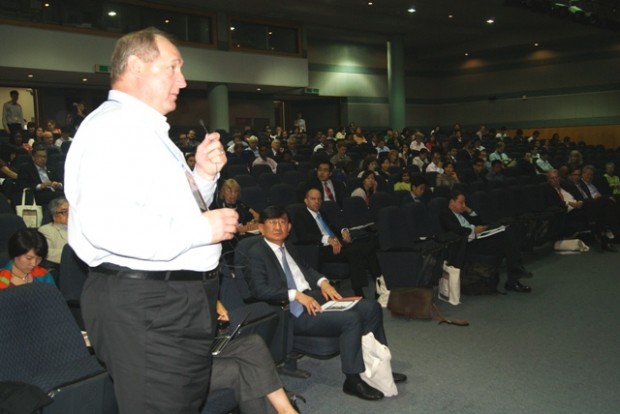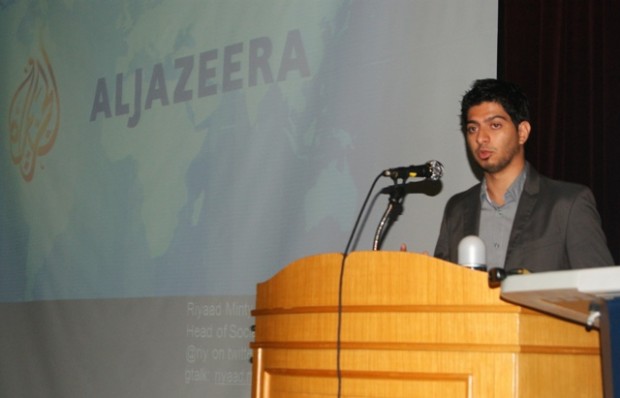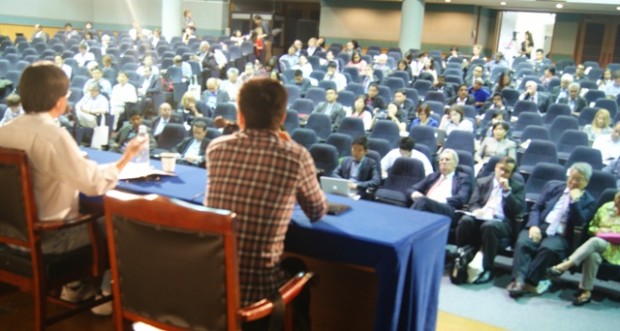Korean embassy visa official in Phnom Penh criticized for being too rigid
View over the Korean Embassy in Phnom Penh
Seoul — It was surprising last week when I went to the South Korean embassy in Phnom Penh to ask for a visa to Seoul for my participation in an international media conference co-organized by the Singapore-based Konrad Adenauer Stiftung/Foundation (KAS) of Germany and the Hawaii-based East West Center of the United States. The invitation is from Mr. Paul Linnarz, Director of Media Programme in Asia of KAS based in Singapore.
Two sentences of the one-page invitation state that the co-organized conference “will look at news and journalism issue in Asia through the prism of New Media. South Korea, the most wired nation in the world, provides ideal venues with its cutting-edge IT industry and dynamic media, including one of the earliest citizen-reporting networks.
Speaking at the opening session here in Seoul, Ms. Susan KREIFELS, Media Programs Manager of the East-West Center, said the conference started from 21-24 June is participated by more than 300 working journalists, media experts and other professionals representing 100 organizations from 27 nations, including Cambodia.

David C. Benton, International Media Specialist of the US. Department of State, asks question to the speaker at the conference on 22 June, 2012. (Photo: Chhay Sophal)
What it is more interesting is that the programme attached with the invitation reads that the four-day conference with the topic of “How Social Media is Shaping Stories and the Way We Tell Them” to be conducted in Yonsei University is focusing on several issues including “lessons from the Arab Spring and Fukushima tragedy and how we can apply them to future news gathering; ….. How digital media is transforming Malaysia, China, South Korea and other Asian countries; Facebook candidates, Twitter campaigns and other social media tactics that are impacting elections in Asia and the U.S.; an assessment of current U.S.-Asia Pacific relations from the top American diplomat in the region; an update on North Korea and Northeast Asia security issues; how North Korea is being covered in the digital age; Asia’s wired cities; a new documentary about covering President Richard Nixon’s historic visit to China”.
However, the most interesting is that an officer at the South Korean’s Visa Section in Phnom Penh said to me that “It is strange that the conference is done in Korea but the organiser is in Singapore”. The officer asked me to have an invitation from Korea rather than from Singapore (sic).
A few days after, I went back to the embassy and presented a new invitation signed by Dr. Norbert Eschborn, KAS representation to Korea. Then, the officer said that the embassy needs an official letter from KAS to the ambassador describing that KAS invites me and shoulders my trip to Korea. It is not hard time and complicated, is it?
Then, a day later, I brought Dr. Norbert Eschborn’s official letter addressing directly to Ambassador Kim Han Soo and I think that it would not have another problem with the visa.
It was incredible then when the official said to me that the embassy needs a copy of the KAS license registered in Korea because KAS is “too small organization” that is not known by many people. My ears then became hot and had big words to the official. To me, I think that there are probably many illegal organisations running in South Korea otherwise the embassy never asks for the license of KAS registered in Seoul.
Even though, the official said it is the new policy of the Korean embassy, I have found here in Seoul that the other participants from other countries have not had such complication from the Korean embassies like the one in Phnom Penh.

Riyaad MINTY — Head of Social Media , Al Jazeera in Doha, Qatar — one quest speaker on "Using New Media: Lesson from Arab Spring". (Photo: Chhay Sophal)
It is unbelievable that although I am a senior Cambodian journalist with academic education, journalism lecturer at the Department of Media and Communication at the Royal Phnom Penh University, book author, and one of the Board Director Members of Club of Cambodian Journalists (CCJ) — the country’s leading media body whose members has up to over 200 working journalists nationwide — the embassy treats me like I am person who is seeking employment as a house servant, waiter, garden or farm keeper, cattle tender, factory worker, fishing worker, bellboy, or porter in Korea. On the other hand, the officials might think that I might be one of the North Korean agents to spy inside the South. Moreover, even though, one of KAS officials in Seoul called the embassy in Phnom Penh to tell the embassy about the invitation, the embassy officials still ask me to bring the original official letter from KAS in Korea upon my return home.
It is not the first time I have been to the dynamic South Korea to attend such international media forums. Since 2004, my trip to South Korea, including one part of North Korea, has been several times, and about more than 20 nations around the world such as the US, Europe, and Australia.
Cambodians are happy with and thank to the Korean government for its loans, grand and humanitarian aid to the Cambodians and their government. We are Asian nationals and the Cambodians really love the Koreans but why the Korean embassy’ visa section officials under Ambassador Kim Han Soo treats a Cambodian senior journalist like that.
KAS is one of the international political organisation in the world and it also has its office in Phnom Penh. Last year, my CCJ with support from KAS, also conducted a round table discussion with Korean Ambassador. Why don’t the Korean embassy’ visa section officials under Ambassador Kim Han Soo know KAS? Do they come from South Korea — the most wired nation in the world, provides ideal venues with its cutting-edge IT industry and dynamic media, including one of the earliest citizen-reporting networks — or from Pyongyang, North Korea, the closed society? I do hope that the Korean embassy’s visa section officials under Amb. Kim would treat the Cambodians like the Cambodians do with the Koreans
When I told my Korean and foreign journalist friends whom I’ve met many times here in Seoul, they opened their big eyes and lifted their eyebrows and asked question why the Phnom Penh-based Korean embassy treat Cambodian journalist like me like that. They wanted to run their stories about such discrimination and I asked them not to do so but they can read an article on my website and my 5,000-friend facebook.



























































Pingback: 캄보디아 기자의 일갈 “한국대사관 직원들은 평양 가서 일하라!” « All « 아시아엔